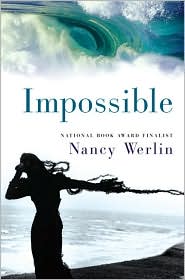 I’d read one or two ecstatic reviews of Nancy Werlin’s Impossible, but they were from readers whose tastes don’t always align with mine, and so I opened the book late one evening, expecting to skim a few pages and turn out the light.
I’d read one or two ecstatic reviews of Nancy Werlin’s Impossible, but they were from readers whose tastes don’t always align with mine, and so I opened the book late one evening, expecting to skim a few pages and turn out the light.You’ve heard that one before.
Lucy Scarborough is seventeen when she discovers that the women of her family have been cursed through the generations, forced to attempt three seemingly impossible tasks or to fall into madness upon their child's birth. But Lucy is the first girl who won't be alone as she tackles the list. She has her fiercely protective foster parents and her childhood friend Zach beside her. Do they have love and strength enough to overcome an age-old evil?
A story rooted in an age-old ballad has the potential to strike deep. You know the lyrics, have long ago accepted the events they chronicle, and are willing, wanting, and waiting to dissolve the haze that surrounds all legendary verse.
Scarborough Fair is already a haunting tune, and Werlin’s embroidery forms a vibrant history behind the words that ensures you will never hear the song again without thinking of this story.
Elements of fantasy are difficult to pull off in a realistic setting. Werlin succeeds quite well. I like this calm acceptance:
“It was also strange to realize that, even if her own particular nightmare was over, she now knew there was another world, close to theirs, a world of magic and curses and uncanny things, a world that was not rational. Lucy did not like to think about this, but there was no other conclusion to be drawn.”
How true is that? In our day, it’s “impossible” to believe in a world outside of logic, of science and provable fact. And yet, as Rodgers’ and Hammerstein’s fairy godmother sings, “Impossible things are happening every day.”
No comments:
Post a Comment